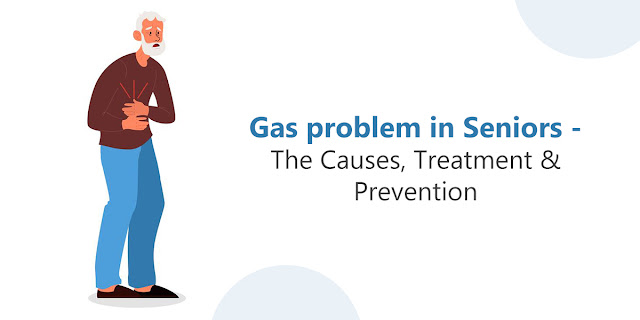Gas Problem in Seniors - The Causes, Treatment, and Prevention
Accumulation of gas inside the stomach is a natural reaction that occurs as a result of the digestion process. The body has a mechanism that releases this gas by burping or by passing gas which is also called as flatus.
Gas is perceived as an issue when it is trapped inside the body or when the digestive system produces unnatural amount of gas. This can happen when the person eats foods that produce more gas or drinks carbonated or aerated beverages.
As true as this statement can get, not all gas issues are related to foods. In a few cases, gas can be one of the symptoms of other health issues.
Gas and Ageing - The Connection
Even though gas is an issue observed in all age groups, it is an issue often associated with the elderly. The digestive functionality in older people tends to get reduced as they advance in age.
As a result, various digestive issues are observed and gas problems in seniors is one among them. Not just digestive-related but seniors get gas as a reaction to the medications they are on for certain health issues.
Continue reading as we connect all the dots as to what causes gas, gas pain or stomach bloating in seniors, when to see the doctor, and how to learn to live with it or find a solution.
Gas pain in elders can range from mild to severe. Sometimes pain can occur as a symptom of other conditions and here are a few symptoms that are associated with gas in seniors.
Gas Symptoms
Belching and burping continuously is one of the major symptoms of gas. Experiencing stomach cramps, feeling fullness without eating a meal, tender and painful stomach, chest pain, and stomach bloating in elders are few of the other symptoms.
Gas Issue in Seniors - The Causes
Gas in seniors is often related to the type of food they are consuming. Some foods are easily digested and some take a long time. Gas gets released as the bacteria in the small and large intestines break the food particles.
Foods such as broccoli, cabbage, peas, prunes, cheese, wheat, bread, dairy products, and even apples are considered as the foods that cause bloating and flatulence.
The Time to See the Doctor
Gas is not a major health concern but it can be an uncomfortable condition to live with. The person is advised to visit the doctor when he or she observes symptoms other than just gas.
Bloating, pain, constipation or diarrhoea, heaviness in chest, and sudden weight loss are the few other symptoms of gas. Your gas specialist will conduct a physical examination while enquiring about the family history and lifestyle habits.
In most cases, gas is not a severe condition and could be treated with the help of over the counter medicines and few changes and adjustments in the diet. However, if the person is feeling severe pain and the daily life is affected, it is time to seek medical help and follow preventive measures as mentioned below.
Prevention Tips for Gas Problem
First step in preventing the gas issue is knowing the foods that you eat and those you shouldn’t. Bringing the needed diet changes and sticking with them is a great solution for gas. The very reason why senior living homes and assisted living facilities provide meals with individual preferences.
To Do:
- Drink fluids before meals but do not drink excess liquids as it may kill you hunger.
- Make room for herbs such as chamomile as it is an excellent remedy for bloating.
- Practice certain yogic postures such as wind relieving pose (apanasana) and bridge pose.
- Exercise regularly and breath with your nose to avoid gas issues.
Not To Do:
- Fix denture issues as loose dentures make the seniors swallow more air. This will, in turn, form gas.
- Avoid fast drinking or eating. Give enough time between each sip or swallow.
- Do not chew gum or avoid any candies as they can cause gas issues.
- Ensure you avoid all types of carbonated drinks as they are the major cause behind 50% of gas issues.
Burping and flatulence are common in everyone. If you are experiencing them more than you ever had, consult with your doctor and follow the preventive measures.




Comments
Post a Comment